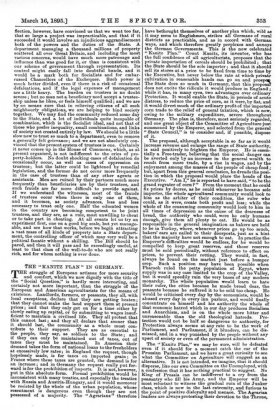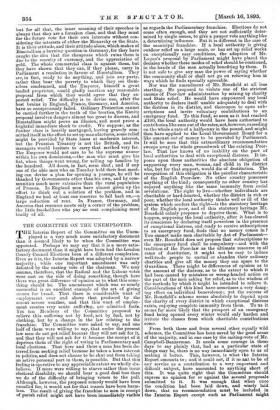THE "KANITZ PLAN" IN GERMANY. T HE struggle of European artisans
for more security and comfort, which we now dignify with the title of the "Social Question," is hardly more interesting, and certainly not more important, than the struggle of the European and American agriculturists for the means of existence. Landlords, farmers, or peasants, they all, with local exceptions, declare that they are getting beaten ; that they cannot make the land support them at present prices ; and that they only get on for a time either by slowly eating up capital, or by submitting to wages insuf- ficient to maintain a civilised life. They all protest that this cannot last ; and they all declare that sooner than it should last, the community as a whole must con- tribute to their support. They are as essential to the people, they say, as soldiers to the State ; and if they can only be maintained out of taxes, out of taxes they must be maintained. In America their demand takes the form of national loans to the freeholders at excessively low rates ; in England the request, though hopelessly made, is for taxes on imported grain ; in France where these taxes are granted, the demand is for an increase ; and in Germany the request really put for- ward is for the prohibition of imports. It is not, however, put in this absolute form. Formal prohibition would be inconsistent with many treaties, and especially the treaties with Russia and Austria-Hungary, and it would moreover be resisted by the whole of the urban population, whose resentment is dangerous even though they are not possessed of a majority. The "Agrarians" therefore have bethought themselves of another plan which, wild as it may seem to Englishmen, strikes all Germans of rural districts as practicable, and as in accord with German ways, and which therefore greatly perplexes and annoys the German Governments. This is the now celebrated " Kanitz Plan." Count Kanitz, its inventor, who has the full confidence of all agriculturists, proposes that the private importation of cereals should be prohibited ; that the State should be the sole importer ; and that it should sell its stores at a price to be fixed from time to time by the Executive, but never below the rate at which private cultivation in reasonable hands can go on and prosp The State does so much in Germany, that this proposaY does not excite the ridicule it would produce in England ; while it has, in many eyes, two advantages over ordinary Protection. It would enable the State, in periods of acute distress, to reduce the price of corn, as it were, by fiat, and it would divert much of the ordinary profit of the imported corn trade to the relief of general taxation, which is now, owing to the military expenditure, severe throughout Germany. The plan is, therefore, most seriously regarded, and one great object of the Committee of Agriculture just summoned by the Emperor, and selected from the general "State Council," is to consider and, if possible, dispose of it.
The proposal, although acceptable in so far as it would increase revenue and enlarge the range of State authority, is said positively to frighten the Emperor. He is essen- tially a Free-trader, believing that the social danger can be averted only by an increase in the general wealth to result from more trade, by a rise in wages, and by the enjoyment among the masses of the people of cheap food; but, apart from this general conclusion, he dreads the posi- tion in which the proposal would place the heads of the Executive. "Am I," he is reported to have said, "to be the grand regrater of corn ? " From the moment that he could fix prices by decree, as he could whenever he became sole importer, the whole agricultural community would look to him as the arbiter of their condition, the ruler who could, as it were, create both profit and loss; while the whole of the consuming community would look to him in all times of depression as the cause of the dearness of bread, the authority who could, were he only humane enough, give them all plenty to eat. He would be as responsible in the general imagination as bakers are held to be in Turkey, where, whenever prices go up too much, bakers' ears are nailed to their doorposts, just as a hint that the majority have not enough to eat. In practice the Emperor's difficulties would be endless, for he would be compelled to keep great reserves, and those reserves must be sold periodically, without reference to effect on prices, to prevent their rotting. They would, in fact, always be found on the market just before a bumper crop. Such a position may have been possible when Pharaoh ruled the petty population of Egypt, where supply was in any case limited to the crop of the Valley, but it would speedily ruin the very bases of any modern monarchy. The whole population would learn to hate their ruler, the cities because he made bread dear, the peasants because he suffered it to be sold too cheap. He would be criticised every day by the economists, would be abused every day in every inn parlour, and would finally concentrate on himself and his authority the whole of that economic hatred which in our day produces Socialism and Anarchism, and is on the whole more bitter and unreasonable than the old theological hatreds. Pro- tection would not be half so dangerous to authority, for Protection always seems at any rate to be the work of Parliament, and Parliament, if it blunders, can be dis- missed, and in a way punished by the people without any upset of society or even of the permanent administration.
The " Kanitz Plan," we may be sure, will be defeated even if it should for a moment catch the ear of the Prussian Parliament, and we have a great curiosity to see what the Committee on Agriculture will suggest as an alternative. It is not intended, we imagine, that it should disperse, like our own Committee on the Unemployed, with a confession that it has nothing practical to suggest. No King of Prussia can be indifferent to a cry from the peasantry who fill his Army, and the Emperor will be most reluctant to witness the gradual ruin of the Junker class, which is now in the last extremity, and furious to the point of positive disloyalty and menace. The Agrarian leaders are always protesting their devotion to the Throne, but for all that, the inner meaning of their speeches is always that they are a forsaken class, and that they must for the future vote for their own interests without con- sidering the interests of either the Monarchy or the State. It is their attitude, and their attitude alone, which makes of Bimetallism a burning question in Germany, for they have caught the idea that the cheapness which ruins them is due to the scarcity of currency, and the appreciation of gold. The whole commercial class is against them, but they have shown that they can, if they please, carry in Parliament a resolution in favour of Bimetallism. They are, in fact, ready to do anything, and join any party, rather than bear the poverty to which they see them- selves condemned, and the Emperor, himself a great Landed proprietor, would gladly sanction any reasonable proposal from which they would agree that they ex- pected relief. The difficulty is to devise one, after the best brains in England. France, Germany, and America, have so conspicuously failed. Ordinary Protection cannot be carried further in the teeth of the treaties, the Kanitz proposal involves dangers almost too great to discuss, and Bimetallism might prove an illusion, and must prove a frightful immediate shock to credit. We suppose, as the Junker class is heavily mortgaged, having gravely com- mitted itself in the effort to set up manufactures, some relief might be provided by State loans at moderate interest, but the Prussian Treasury is not the British, and its managers would hesitate to carry that method very far. The Emperor would not care to be the supreme usurer within his own dominions,—the man who must give his fiat, when things went wrong, for selling up families by the hundred. All doors, in fact, seem shut ; and if any one of the able men who on Tuesday held their first meet- ing can devise a plan for opening a passage, he will be thanked by Governments other than his own, and by com- munities much more extensive than the rural population of Prussia. In England men have almost given up the effort to think out a solution of the problem, and in England we had at least one resource to fall back on,—a large reduction of rent. In France, Germany, and America that resource meets only a corner of the problem, the little freeholders who pay no rent complaining most loudly of all.



































 Previous page
Previous page